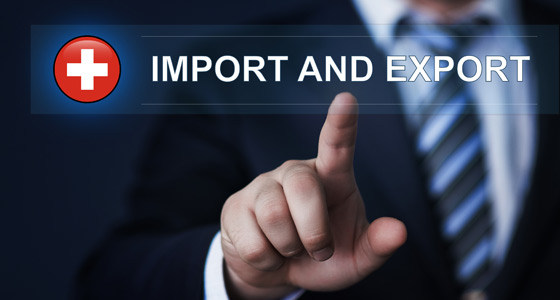
Switzerland: New electronic notification system for exports and imports
From March 1, 2018, all businesses must notify the Swiss customs authority (EZV) of cross-border transactions of goods with Switzerland electronically.
With regard to the export of goods from Switzerland: the Swiss VAT Law (SVATL) defines the place of delivery where the transport of the goods begins. Tax-exempt delivery therefore requires a correct export document. All exports from Switzerland, except for exports of goods through private travelers, have to be registered prior to crossing the border with the goods in the electronic system of the federal customs authority “e-dec”.
There are three categories applicable to importing goods into Switzerland: goods only, mail order business with private individuals, and goods with services, such as goods for installation, repair and maintenance.
The following applies when importing goods only: since the place of delivery is outside Switzerland according to the SVATL, the importer is the client (unless in the mail order business), so the import notification procedure “Unterstellungserklärung” is not applied and the incoterm®2010 DDP is not used. The Swiss customer has to file the import document “eVV” electronically and has to be named as importer of the goods in the eVV. A printed copy is valid proof neither for the federal tax administration “ESTV” for VAT purposes nor for the federal customs authority “EZV”.
Where the mail order regulation is applicable, the supplier must be VAT registered in Switzerland from January 1, 2019, and all goods have to be imported into Switzerland in the supplier’s name for his or her account., The supplier therefore has to file the eVV electronically in order to claim the import VAT in his or her Swiss VAT return.
Index figures 2017
Swiss exports and imports, in total
| direction of traffic | in CHF bn | variance in % |
| export | 295 | -1.2 |
| import | 246 | -0.7 |
| balance | 31 | -5.1 |
The most important trading partners
| country | in CHF bn. | percentage |
| Germany | 45 | 15.2 |
| USA | 36 | 12.3 |
| China | 25 | 8.2 |
(Source: Schweizerische Eidgenossenschaft, Federal Customs Administration, www.ezv.admin.ch)
As per January 1, 2018, most of the changes occurred in the third category. Suppliers selling goods involving installation or providing repair and maintenance in Switzerland with a worldwide turnover of more than CHF 100,000 have to be VAT registered in Switzerland. The supplier is therefore the importer, even when the delivery address is at the customer’s place. The import VAT is based on the value of the goods including the freight costs up to the first place of delivery within Switzerland. The supplier can claim for the import VAT in his or her Swiss VAT return, if he or she has a correctly issued, electronically stored eVV as proof.
 Even now when all customs declarations must be done online, the difficulties of having a correct and cost-effective customs management remain.
Even now when all customs declarations must be done online, the difficulties of having a correct and cost-effective customs management remain.
How can customs duty be avoided?
When the goods have their preferential origin in the EU, the goods can be imported into Switzerland at a reduced customs duty rate or even at a zero rate. The preferential origin needs to be declared to the customs authority before the goods leave the customs area and the customs procedure is closed. If the supplier is an authorised exporter or the value of the invoice does not exceed EUR 6,000/CHF 10,300 the declaration can be made directly on the invoice. If this is not the case a correct EUR1 has to be presented to the customs authority while the goods are still under customs control. Should the goods already have left the customs area and the customs procedure closed, the preferential origin cannot be claimed retroactively and a formally wrong declaration cannot be corrected, warn the experts at Ecovis. In this case, the customs duty remains as an expense.
It is also possible to save customs duty on goods with a high customs duty rate if they are transported cross-border for repair and maintenance, conditioning or return of goods. Instead of regular export and import duties, a special customs regime can be applied.


